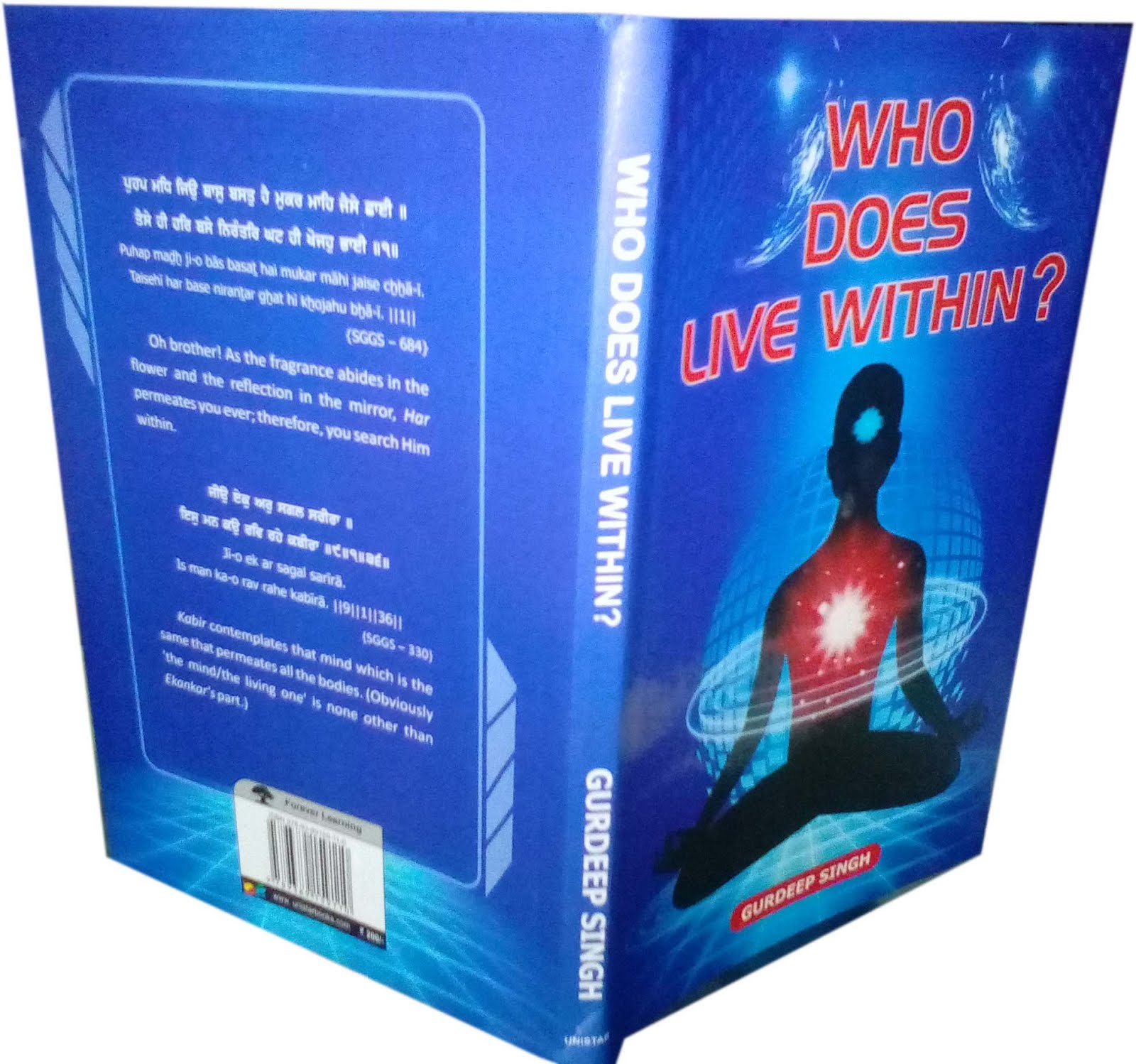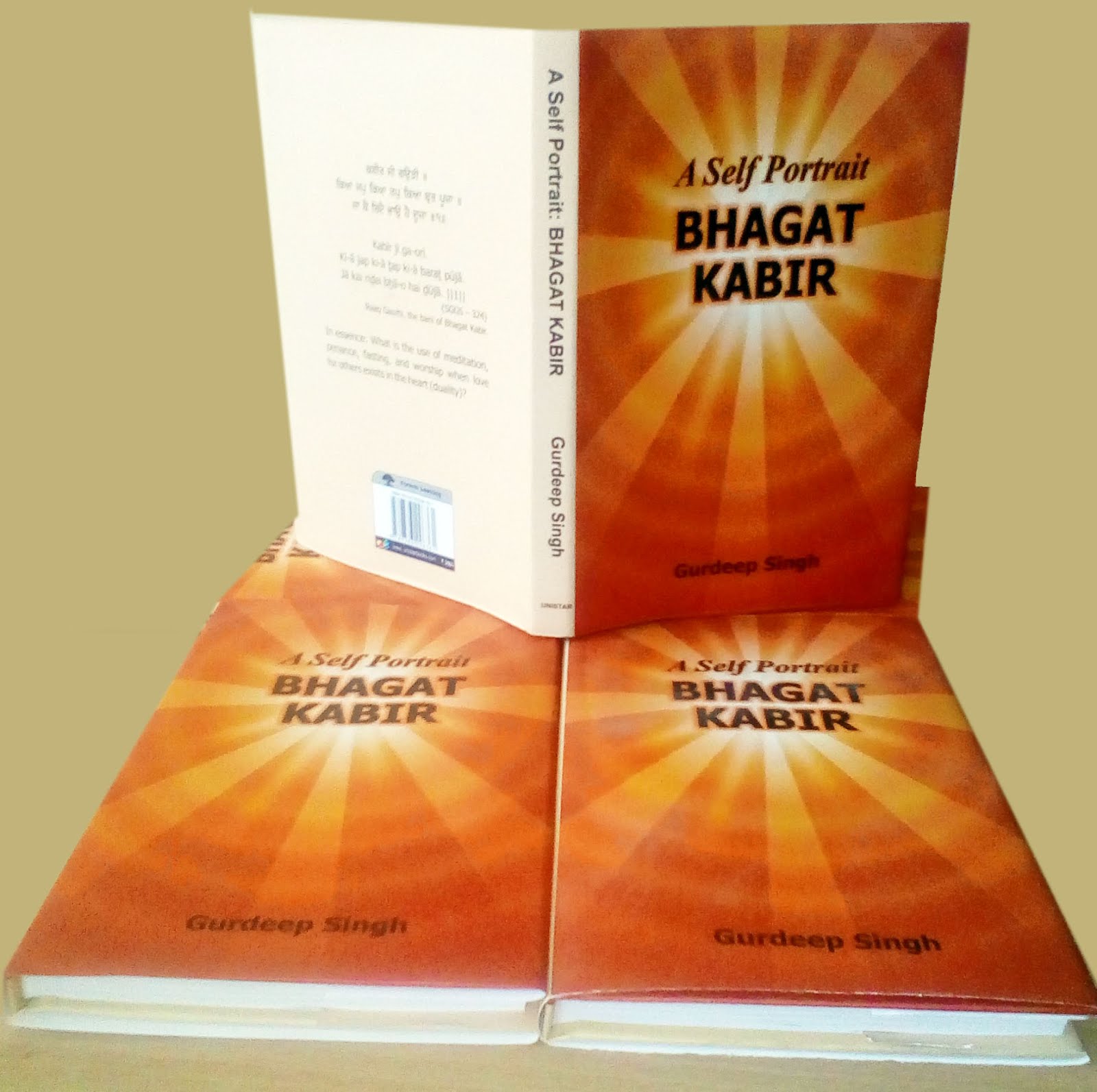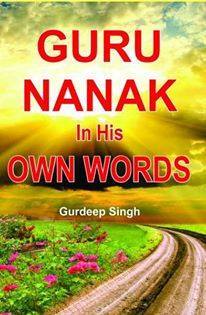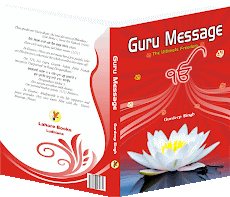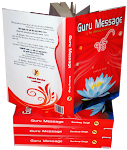Today - a
time of reason - is overtaken by fears that have triggered superstitious
beliefs; today, more people are practicing nonsensical rites than ever. It appears that people are in fear and they are trying to please any entity having a reputation of ‘hearsay miracles”” without using their brains. First Nanak, the
founder of a way of life named Sikhi, which leads his followers away from superstitious
beliefs, stresses repeatedly that indulgence in mundane affairs along with
hearsay miracles only becomes a cause of miseries here and hereafter. He pities
the plight of the Pathan-rulers incontext of Mughal Babur’s invasion; it is on
417-18, SGGS:
Kotee hoo peer varaj rahaa-ay
jaa meer suni-aa Dhaa-i-aa.
Thaan mukaam jalay bij mandar
muchh muchh ku-ir rulaa-i-aa.
Ko-ee mugal na ho-aa andhaa
kinai na parchaa laa-i-aa. ||4||
In essence: On hearing of the invasion of Mir Babur, the Pathan rulers summoned religious leaders to halt him with magic
tricks, but all their strongly built places and mansions were burnt down and
the princes were cut into pieces. Because of the magic, no Mughal got blinded (as the men of miracle claimed) and no miracle
occurred (in this regard).
What Pathan
rulers did? They took refuge in the miracles of Peers instead of realizing their duty beforehand. Black magic was
placed in force. Their acts were pitiable and laughable. The History of India
was changed once for all, because they didn’t remain aware of any outside
threat. Tenth Nanak obviously was
inspired by First Nanak to create Khalsa so that the followers could also
learn how to face cruel suppression like this without giving in.
First
Nanak has taken reason and logic as strong weapons to defuse imaginative
illusions, but he has also said that the existence of the Creator and hereafter
realms are beyond logic, reason and description; we can try to explain but how
can we verify the indescribable?
ki-aa ha-o kathee kathay kath daykhaa mai akath na kathnaa jaa-ee.
jo tuDh bhaavai so-ee aakhaa til tayree vadi-aa-ee. ||3||
Oh my inexpressible Prabh! I cannot express your virtues! When I try to do so, I come
to know that you are inexpressible; therefore, I cannot express you. I say what
pleases you (as per your “will”), but it is an iota of your greatness I have
expressed.
Many of
his Sikhs don’t believe in “hereafter scenario” though he clearly states that.
They are too much influenced by the discoveries of science, which tells only
that which can be verified. Unfortunately, we have no affirmation of the
Creator’s existence, but we believe in His existence doubtlessly. Do we need
science to start believing in Him or we will follow our faith in Him without
the science? Science has not explained each and every phenomena of nature.
According to First Nanak, life doesn’t end here; he also says that actually
there is no death; what is seen in this context is nothing but an end of a
thing that is bound to perish; on 152, SGGS, First Nanak makes it clear that
actually death occurs to the body only:
Ha-o
na moo-aa mayree mu-ee balaa-ay.
Oh na
moo-aa jo rahi-aa samaa-ay.
Kaho
naanak gur barahm dikhaa-i-aa.
Martaa jaataa nadar
na aa-i-aa. ||4||4||
In essence: Nanak says this:
The Guru has shown me Akalpurakh, and I don’t see anyone
dying or going. I understand that it is the calamitous conceit (in the body)
that has died not I, the soul. Akalpurakh
(that part of the soul that exists in all), who pervades all, doesn’t die
either.
Finally I
have learned that there is no use of debating with those people, who don’t
believe in “after death” scenario but believe in the existence of the Creator
throwing their hyper rationality out of the window. Only difference between
them and me is that I have refused to turn a deaf ear toward the crystal clear
sayings of the Guru. Below I will share this with those, who are still interested
to go beyond the unknown and indescribable.
First
look how First Nanak kicks away the so much loved stuff by the world. Why does
he do so? If we read between the lines what he is trying to say, we can
conclude that without living in the memory of our Creator, we lack that what is
very beneficial to us: for our peace of mind and worry-free lives.
Salok mėhlā 1.
Saram ḏẖaram ḏu▫e nānkā je ḏẖan palai pā▫e.
So ḏẖan miṯar na kāʼndẖī▫ai jiṯ sir cẖotāʼn kẖā▫e.
Jin kai
palai ḏẖan vasai ṯin kā nā▫o fakīr.
Jinĥ kai hirḏai ṯū vasėh ṯe nar guṇī gahīr. ||1||
In essence: Oh Nanak!
Many believe that if one has wealth, one can perform Dharma right way, but
wealth cannot be considered a friend; actually one suffers because of it. Those
persons, who have wealth, should be called paupers actually. Oh Akalpurakh! Those, in whose hearts you
dwell, are like the deep ocean of virtues.
Those people who claim to be one
of the richest people in the world are very poor according to First Nanak. How
will anyone believe in it with a reason? Only then one believes this when one
realizes that a rich mandeparts this world taking nothing with him as all do,
and add to his deficiency, he hasn’t obtained the other wealth, the
Naam-wealth. Those, who don’t believe that the Naam-wealth is taken with as the
time comes to depart from here, will never understand First Nanak. Just to
share with you how they become lazy to search deep into what the Guru says; for
example: very loudly they proclaim that First Nanak says,” Truthful living is
above all” as they read this:
Manhath budhee kaytee-aa
kaytay bayd beechaar.
Kaytay bandhan jee-a kay
gurmukh mokhdu-aar.
Sachahu orai sabhko upar sach
aachaar. ||5||
In essence: There are many persons of stubborn intellect and there are
contemplations of the Vedas. There
are so many entanglements for the soul, but it is only through the Guru that the door of liberation is
obtained. All techniques are below Prabh,
but remembering Prabh is above
all.
In the above verses, “Sach” is
used for Prabh and “Awcwru achaar” for His
praise; many people interpret it (Awcwru
achaar) as
“truthful living”, but as per the Guru’s advice,
there is nothing above contemplating Naam
including good deeds. Please look at 1222, SGGS:
Sarvanee keertan simran
su-aamee ih saadh ko aachaar.
To hear
Prabh’s praise and to do His
praise is the character of His devotee.
Besides, had
First Nanak considered “ਆਚਾਰੁ achaar”
above all, why would he say, “through Awcwru, Akalpurakh is
not realized” on 355:
Aachaaree nahee jeeti-aa jaa-ay.
Paath
parhai nahee keemat paa-ay.
Asat dasee chahu bhaydna
paa-i-aa.
Naanak satgur barahm dikhaa-i-aa. ||5||20||
Obviously
the Guru first gives reference to the practice of penances, the Vedas and their
discussion; then he says that these acts are below the act of remembering the
Creator’s name. This is all about the Naam-wealth.
What is
the Naam-wealth? It is a different issue, which needs a lot of pages to explain;
however, in simple words, it can be explained like this: while living in this
world, when a person, while performing all his or her due duties, becomes
detached in the memory of the Creator, he or she also procures the Naam-wealth.
Living in His memory gives us what we cannot buy with the worldly wealth. What is that? It is a chance to be one with
Him while alive; it is an ultimate experience and ecstasy
In the
below Slok, the Guru details the story of the mortal who becomes indulgent in
the mundane affairs forgetting the source of his origin, the Creator:
Mėhlā 1.
Ḏukẖīḏunī saheṛī▫ai jā▫e ṯa lagėh ḏukẖ.
Nānak sacẖe nām bin kisai na lathī bẖukẖ.
Rūpī bẖukẖna uṯrai jāʼnḏekẖāʼnṯāʼn bẖukẖ.
Jeṯe ras sarīr ke ṯeṯe lagėh ḏukẖ. ||2||
The bani
of First Nanak:
In essence: By going through pain, one gathers wealth and it
gives pain when it is gone. Oh Nanak! Without Har’s Naam, no one is satiated.
Beholding beauty, one is not satiated, because one’s urge to see it more and
more increases. The more pleasures the body enjoys, the more pains cling to it.
Have we ever seen a person saying,”
I have everything; I am fully satisfied and I don’t need anything more; now I
will not be upset ever on anything?” If someone says so, we know that such a statement
cannot be true. What is missing then? The same, “the Naam-wealth”, but our over
indulgence in the worldly wealth and affairs negates our belief that to have the
true wealth is living in His memory. The Guru says that living here should
beas a guest visits to his relatives or friends; nothing more that; because we
don’t see that way, we fail to understand our Guru. Please see the following
verses on 350, SGGS
Maanas moorat naanak naam.
Karnee
kutaa dar furmaan.
Gur parsaad jaanai mihmaan.
Taa
kichhdargeh paavai maan. ||4||4||
In essence: Nanak says: the humans are humans only for
name’s sake; actually their deeds are like of dogs, but they are under His
ordinance. If a human being deems him or her as Prabh’s guest in this world, only then in His court, he or she can
get some degree of honor
We get confused about Tenth Nanak’s a
given verification of living like a guest; he is often portrayed to be fully
involved in the mundane affairs, but we never see how deeply he remained
detached also though he proved it. Many historians failed to see that because of
the veil of the worldly royal congregation he had to keep. If one has to be a commander for the purpose
of self-defense, one has to keep what he did, but internally he was totally
detached; after he passed away, the Mughal emperor Bahadur Shah deemed his
property as “the property of a Darvesh/detached”. The historians don’t see him
pining for the stability of his followers even after loosing his everything and
every relation. Tenth Nanak never overstepped the advice of First Nanak. It is
all internal detachment that changes the behavior. A person can be very much
wealthy and detached as well. Thus Tenth Nanak’s decisions he ever took proved
that he was detached; indeed, he never stuck with the mundane affairs and his
firm belief in internal detachment never faded away either. We are right in the
middle of the Maya game; it is difficult to become detached, but it is not
impossible. While performing our due duties, we can remain attached to our
Creator; our attachment to Him will turn us into detached ones. Now see how
First Nanak guides us to his spiritual realms:
Mėhlā 1.
Anḏẖī kammī anḏẖ man man anḏẖai ṯan anḏẖ.
Cẖikaṛ lā▫i▫ai ki▫ā thī▫ai jāʼnṯutai pathar banḏẖ.
Banḏẖṯutā beṛī nahī nāṯulhā nā hāth.
Nānak sacẖe nām viṇ keṯe dube sāth. ||3||
In essence: Doing blind (in ignorance) deeds brings darkness to
the mind and the body becomes dark too (the body-organs inspire to do blind
deeds more.). What can do a mud plastering when the cemented-dam caves in? (Here
is the situation) The dam is broken, but there is no boat or raft to get saved
from the soaring water (when one gives in to the worldly urges, a little bit
control will not do any good; as one is into strong temptations, one is
destined to get drowned in them without the Guru’s guidance) Oh Nanak! Without
Akalpurakh’s Naam, many multitudes of persons have drowned.
Sometimes
just for a show of, some people perform good deeds, or some just do good deeds
as they feel, but it is not enough according to the Guru. Why? A little effort
like this will not eradicate the influence of our indulgence in vice ridden
desires and acts. We need our Guru, who can show us how to live in the world
heavily affected by Maya.
Through
the next Slok, First Nanak tells us that all that stuff people take pride in is
not helpful in the journey our souls take:
Mėhlā 1.
Lakẖ maṇ su▫inā lakẖ maṇ rupā lakẖ sāhā sir sāh.
Lakẖ laskar lakẖ vāje neje lakẖī gẖoṛī pāṯisāh.
Jithai sā▫ir langẖ▫ṇā agan pāṇī asgāh.
Kanḏẖīḏis naāvīḏẖāhī pavai kahāh.
Nānak
othai jāṇī▫ahi sāh ke▫ī pāṯisāh. ||4||
In essence: The bani of First Nanak: in essence: One may have lacks
monds (Punjabi weights) of gold and silver and one may be richer than lacks of
rich people; a monarch may have lacks military, lacks of bands and lacks of
spears-holders and horses; the path through the soul passes is like the
unfathomable and deep ocean filled with fire and water, and on that path, no
bank is in sight; there an uproar of lamentation is heard. Oh Nanak! There it
will be judged, who is really rich or king.
What is
that through which the worldly monarchs and rich people pass? If it is a
metaphoric expression, why there negation of wealth is pointed out? What is
that place where the kings are not accepted as kings and the rich people are
not considered rich? Here in this world, the people, who are rich, are
considered rich and a king is considered a king. What the Guru is talking about
then? Obviously, he is talking about here after scenario. If some people have
difficulty to accept it, it doesn’t mean the Guru s not saying that.
In the
following Slokas, the Guru again stresses on worthless indulgence in the worldly
wealth pursuits and the connected negative effects; he concludes that without
remembering the Creator’s name, all is filth.
Salok mėhlā 1.
Rūpai kāmai ḏosṯī bẖukẖai sāḏai gandẖ.
Labai mālai gẖul mil micẖal ūʼngẖai sa▫uṛ palangẖ.
Bẖaʼnukai kop kẖu▫ār ho▫e fakaṛ pite anḏẖ.
Cẖupai cẖanga nānkā viṇ nāvai muhi ganḏẖ. ||1||
In essence: Beauty has friendship with lust; hunger has alliance
with taste; the greedy one obtains wealth and gets in bed with it. A sleepy
person considers a small place as an elegant bed. In anger one gets into
miseries and speaks nonsense. Oh Nanak! It is better to be quiet, because mouth
gets filthy without Prabh’s name (while living in His memory, one’s everything
carries positivity).
In the following, the Guru picks on
regime, wealth, beauty, high caste and youth; he says: these ones take the
world into illusions by taking it away from the loving Creator. Only through
the Guru, one can negate their effect.
Mėhlā 1.
Rāj māl rūp jāṯ joban panje ṯẖag.
Ėnīṯẖagīʼn jag ṯẖagi▫ā kinai
na rakẖī laj.
Ėnāṯẖagniĥṯẖag se jė gur kī pairī pāhi.
Nānak karmā bāhre hor
keṯe muṯẖe jāhi. ||2||
In essence: Regime, wealth, beauty, high caste, and youth,
these all five are just like robbers. These five thugs have robbed the world
(of virtues) and no one’s honor is spared. Those persons, who take refuge in
the Guru, rob these fives (Because the Guru guides them to live in Akalpurakh’s
memory while honoring His Will; then their pride in ruling, wealth, beauty,
caste and youth totally disappears). Oh Nanak! Without good luck (provided by
Akalpurakh) many others are being robbed by the five ones.
Here is a declaration of First Nanak
about these things:
Ga-orhee
mehlaa 1.
Cho-aa chandan ank charhaava-o.
Paat
patambar pahir hadhaava-o.
Bin har naam kahaa sukh paava-o. ||1||
Raag Gaurhi,the bani
of First Nanak.
In essence: Even if I apply perfume of Chandan and wear silky robes, I cannot obtain peace and comfort
without Har’s Naam.
Ki-aa
pahira-o ki-aa odhdikhaava-o.
Bin
jagdees kahaa sukh paava-o. ||1|| rahaa-o.
What
is should I wear to make a show? I cannot obtain peace and comfort without Har, the Master of the world. Pause.
Kaanee
kundal gal motee-an kee maalaa.
Laal nihaalee fool gulaalaa.
Bin
jagdees kahaa sukhbhaalaa. ||2||
If
I wear earrings and garland of pearls around my neck and if I keep flowers and
red coverlet on the red mat, how can I obtain peace and comfort without Prabh, the Master of the world?
Nain
salonee sundar naaree.
Khorh seegaar karai at
pi-aaree.
Bin
jagdees bhajay nitkhu-aaree. ||3||
(The Guru expresses the worldly attractions
and the mortal’s indulgence in it without
Prabh’s memory) Even if I have a beautiful wife, who has very attractive eyes
and who decorates herself for me and loves me, but without remembering Prabh, the world Master, I will remain
in miseries every day.
The idea of the Maya attraction continues:
Dar ghar
mehlaa sayj sukhaalee.
Ahinis fool bichhaavai maalee.
Bin
har naam so dayh dukhaalee. ||4||
To
rest, if I have big comfortable houses and my luxurious bed is decorated
everyday with flowers by a gardener, without
Har’s Naam, my body still remains miserable.
Haivar
gaivar nayjay vaajay.
Laskar nayb khavaasee paajay.
Bin
jagdees jhoothay divaajay. ||5||
If
I have excellent horses, fine elephants, musical bands, armies, Naib, royal servants and ostentatious
display, but these will be false a show without Akalpurakh.
Sidh
kahaava-o ridh sidh bulaava-o.
Taaj kulah sir chhatar
banaava-o.
Bin
jagdees kahaa sach paava-o. ||6||
If
I were called a man of miracle with riches and supernatural powers and if I had
a crown on my head and royal hat with royal umbrella, how could I obtain
eternal stability without Prabh?
Khaan
malook kahaava-o raajaa.
Abay tabay koorhay hai paajaa.
Bin
gur sabadna savras kaajaa. ||7||
If
I am called an emperor, a lord or a King, and I treat my servants arrogantly,
but all this show is destined to perish, because without the Guru’s shabda, my purpose of life is
not accomplished.
Ha-umai
mamtaa gur sabad visaaree.
Gurmat jaani-aa ridai
muraaree.
Paranvat
naanak sarantumaaree. ||8||10||
Humbly
Nanak says: oh Akalpurakh! I am in your refuge. Through the Guru’s shabda, one’s conceit and infatuation are eradicated.
Through the Guru, Prabh is recognized
within the heart.
The
Guru advises his followers by giving examples of established truth in a
society: he guides them how they can get attached to the Creator:
Mehlaa
1.
Kaihaa kanchan tutai saar.
Agnee gandh paa-ay lohaar.
Goree
saytee tutai bhataar.
Puteen gandh
pavai sansaar.
Raajaa mangai ditai gandh paa-ay.
Bhukhi-aa
gandh pavai jaa khaa-ay.
Kaalaa gandh nadee-aa meeh jhol.
Gandh
pareetee mithay bol.
Baydaa gandh bolay sach ko-ay.
Mu-i-aa
gandh naykee sat ho-ay.
Ayt
gandh vartai sansaar.
Moorakh
gandh pavai muhi maar.
Naanak aakhai ayhu beechaar.
Siftee
gandh pavai darbaar.||2||
First Nanak.
In essence: When bronze, or gold or iron breaks, the smith
welds it with fire. When husband and wife break away, through their son, their
reconciliation is materialized because of their continuity of ancestry. When the
king demands revenue, by giving it to him, a bond is established. Hungry person
can keep relations if he gets something to eat. Relief from famine is obtained
when the rivers run with heavy rain. Sweet words fortify the love. When one
speaks the truth, one’s bond is built with religious scriptures. If a person
does good deeds, after death, the world shows bond with him by remembering him.
Such kinds of alliances prevail in the world. Fools are mended with punishment.
Nanak expresses this fact
that the bond with the Creator is made through praising Him.
On
469, the Guru indicates hereafter scenario; if one is bent upon distorting his
words, what we can do, but he is very convincing that hereafter no caste or
effect of riches carry any weight,
because there unlike these lives, which are programmed to give importance to
riches, new ones are encountered:
Mehlaa 1.
Vadee so vajag
naankaa sachaa vaykhai so-ay.
Sabhnee chhaalaa
maaree-aa kartaa karay so ho-ay.
Agai jaatna jor hai
agai jee-o navay.
Jin kee laykhai pat
pavai changay say-ee kay-ay. ||3||
Slok of First Nanak.
In
essence: Oh Nanak! What Prabh has ordained is going to occur and
He watches all that. All people jump in claiming what they will
do, but it will happen what Akalpurakh,
the Creator, wants. Hereafter, there is no caste and no one can exercise one’s
power; there, the being has to deal with the new beings. Only those are good
ones, who get honor according to the account (of deeds).
First Nanak makes his followers to
remain aware how indulgence in Maya works negatively and how Akalpurakh’s love
becomes support; this shabda is on 1331, SGGS:
Parbẖāṯī mėhlā 1.
Kẖā▫i▫ā mail vaḏẖā▫i▫ā paiḏẖai gẖar kī hāṇ.
Bak bak vāḏ cẖalā▫i▫ā bin nāvai bikẖ jāṇ. ||1||
Raag
Parbhati, the bani of First Nanak
In essence: when one only eats and wears without
remembering Prabh, one gathers filth and remains at loss. One argues and
prattles; without His name, it is all nothing but poison.
Bābā aisā bikẖam jāl man vāsi▫ā.
Bibal jẖāg sahj pargāsi▫ā.||1|| rahā▫o.
Oh wise
man! The mind gets caught in a difficult net. When one gets illuminated with
Har’s grace, one ferries across the storm. Pause
Bikẖ kẖāṇā bikẖ bolṇā bikẖ kī kār kamā▫e.
Jam ḏar bāḏẖe mārī▫ah cẖẖūtas sācẖai nā▫e. ||2||
One
tastes the Maya poison and utters poisonous words; this way, one does the
poisonous deeds. Such mortals are bound by the fear of death; only Har’s name
can liberate them from it.
Jiv ā▫i▫āṯiv jā▫isī kī▫ā likẖ lai jā▫e.
Manmukẖ mūl gavā▫i▫āḏargėh milai sajā▫e. ||3||
As one
comes with nothing, one goes with nothing, but one goes with an account of
one’s deeds. Thus the mind-slave loses his capital and suffers in Akalpurakh’s
court.
Jag kẖotou sacẖ
nirmalou gur sabḏīʼn vīcẖār.
Ŧe nar virle jāṇī▫ahi jin anṯar gi▫ān murār. ||4||
The
attachment of the world is unclean but Prabh is pure; through the Guru, one
gets attached with Him. Those men, who have the divine knowledge, are rare.
Ajar
jarai nījẖar jẖarai
amar anand sarūp.
Nānak jal kou mīn sai the bẖāvai rākẖo parīṯ.
||5||13||
When the
mortal tolerates the unbearable, eternal bliss flows in him and he becomes the
embodiment of happiness. Oh Akalpurakh! I, Nanak, long to have your love, as
the fish loves water; bless me with your love.
First Nanak doesn’t want us to
become recluses; instead he wants us to live keeping our Creator’s memory in
our hearts; he wants us to live as a guest, who doesn’t gets attached to the
things he sees. Try to act like a guest and to think again and again about the
Creator, you will experience unique feelings enveloping you within. The experience
of anything is a result of efforts not talks.
Humbly,
G Singh


